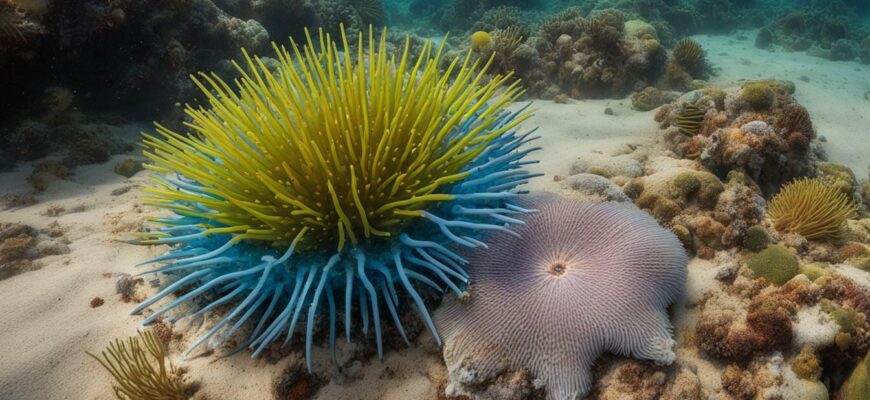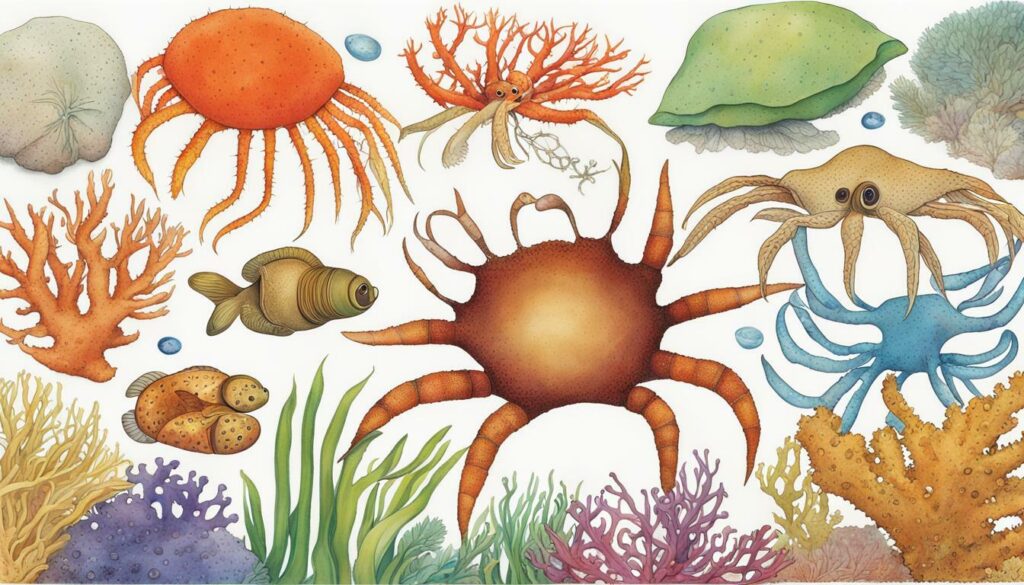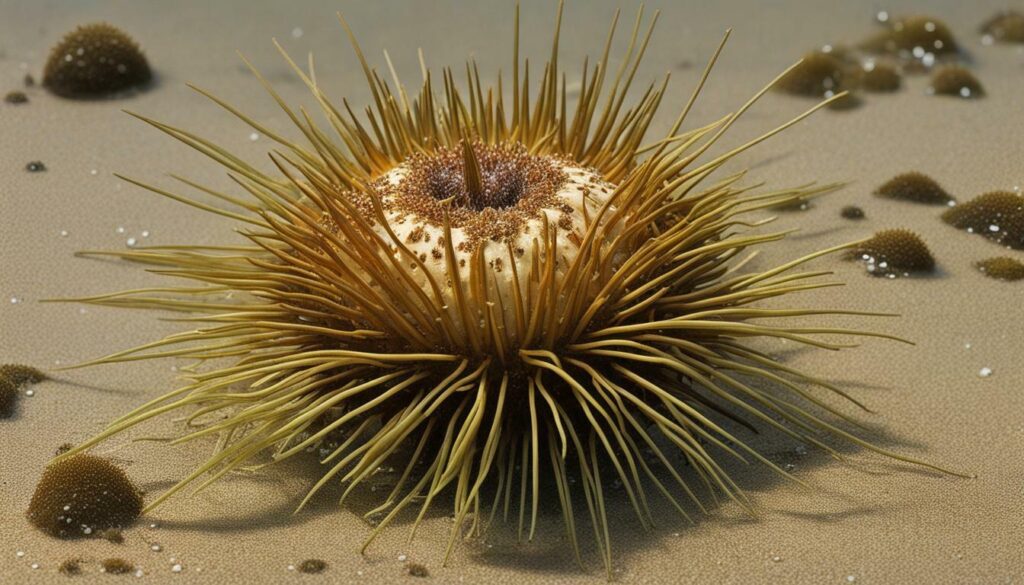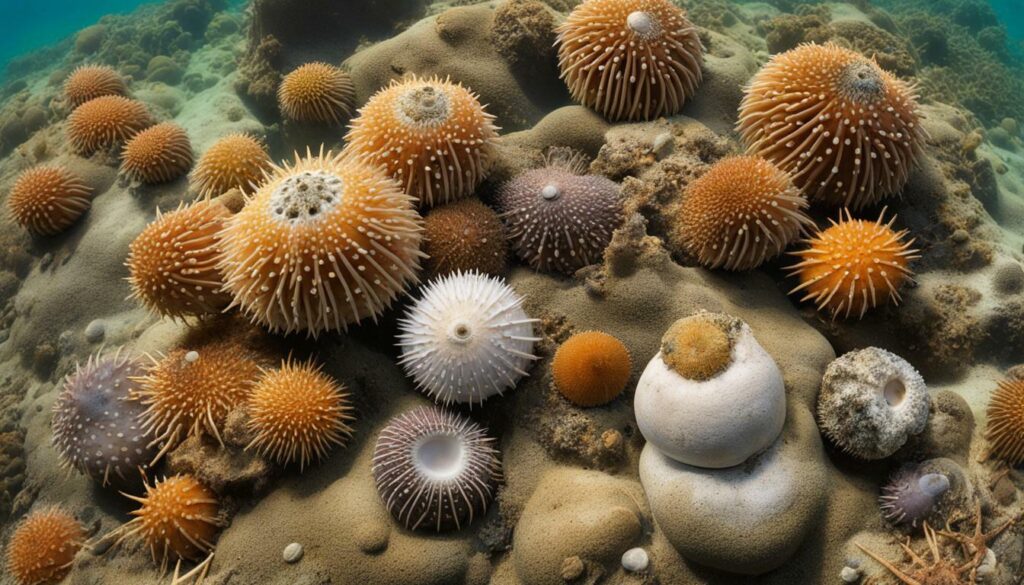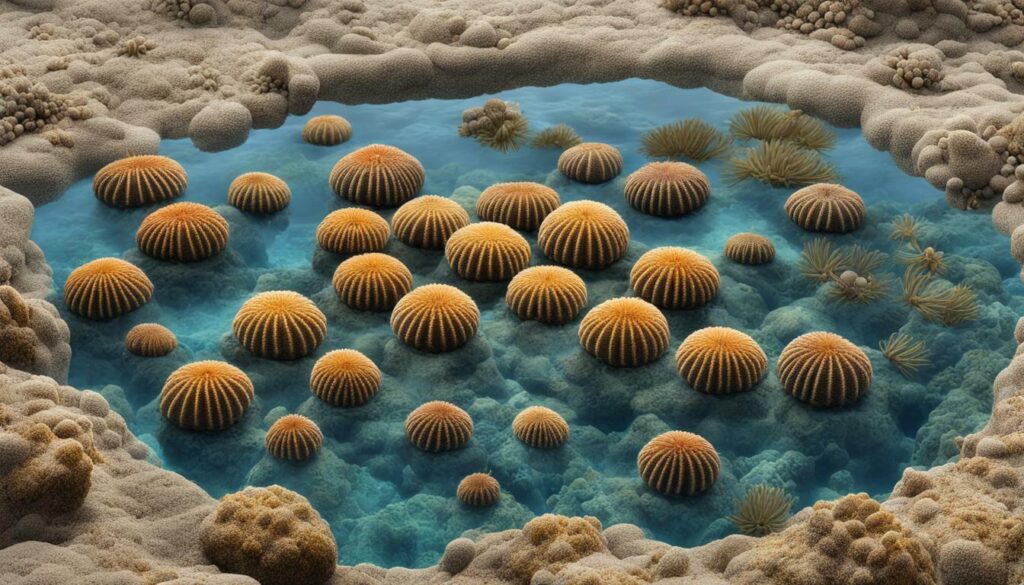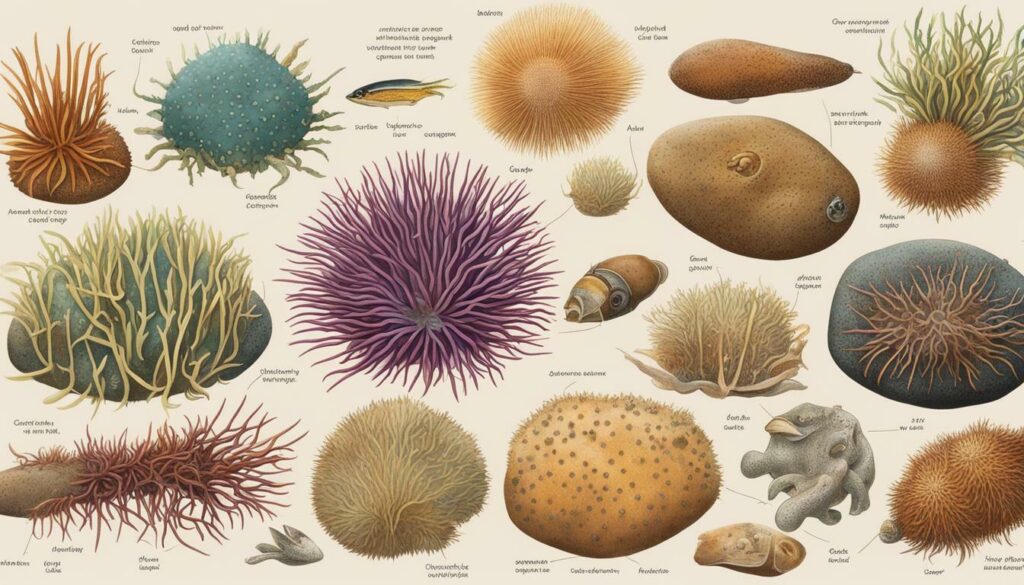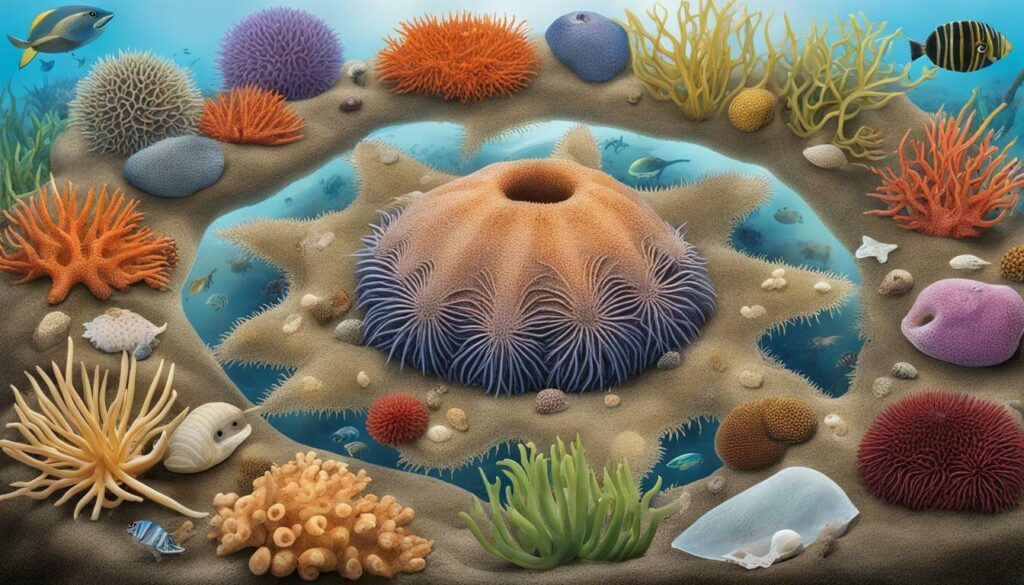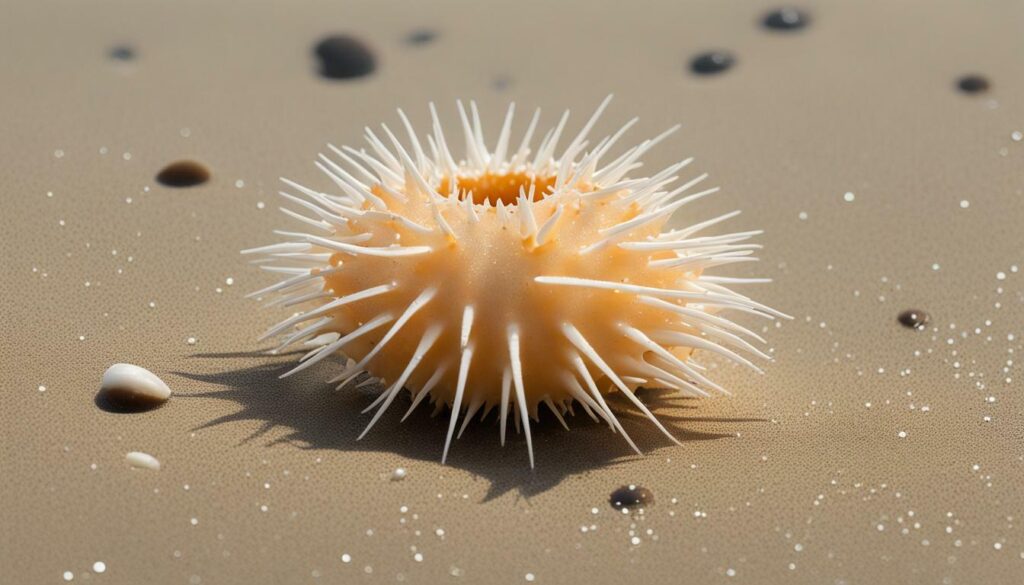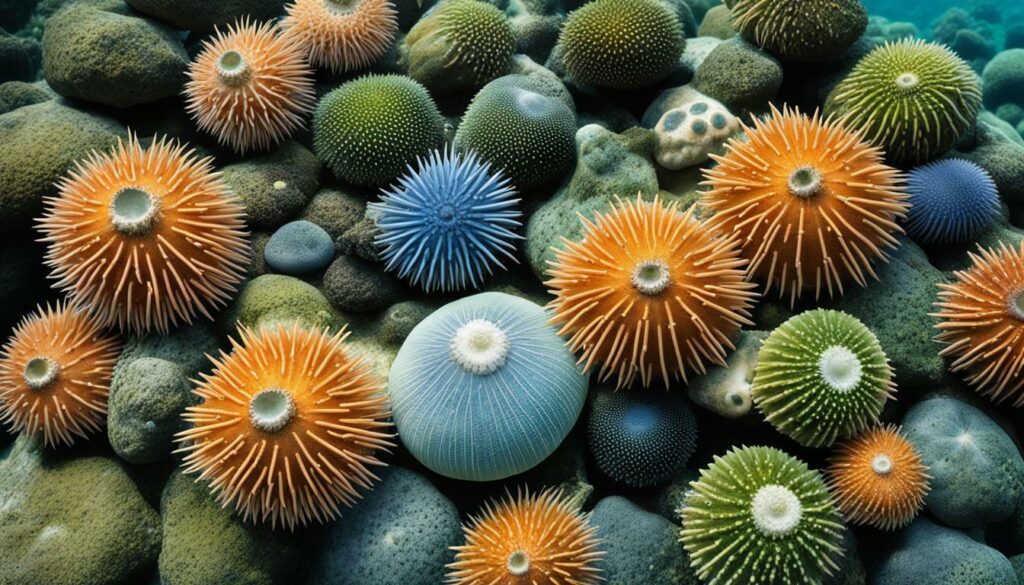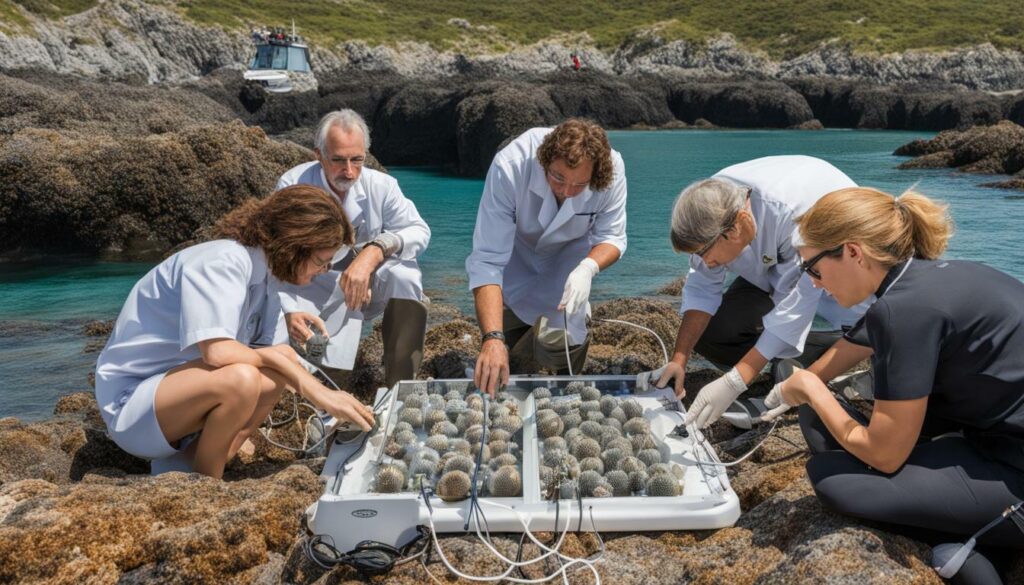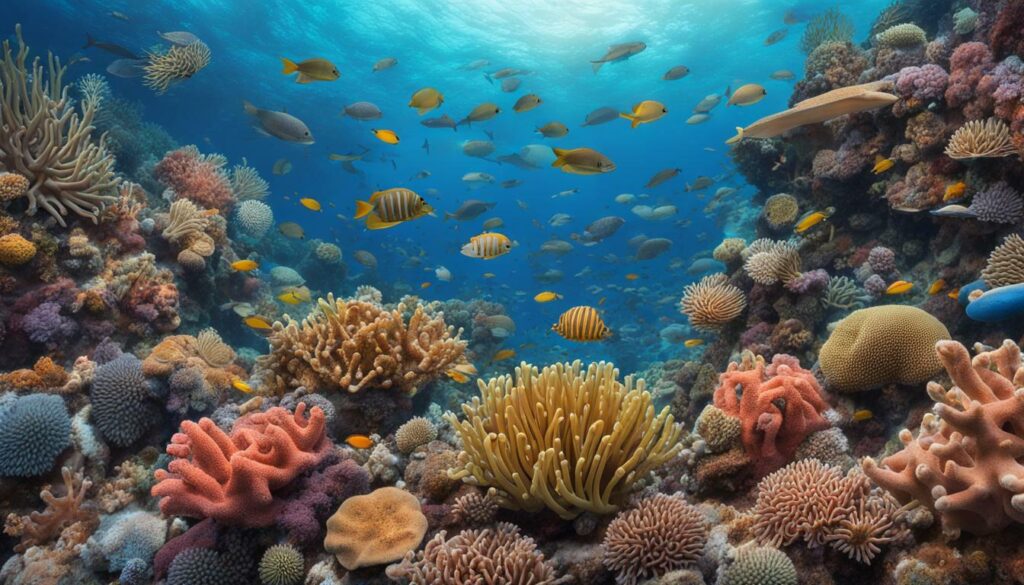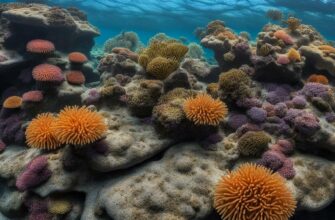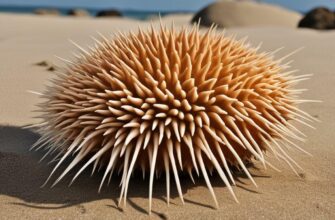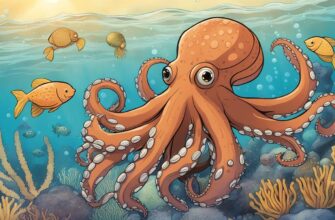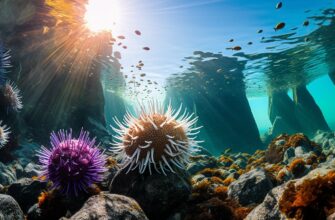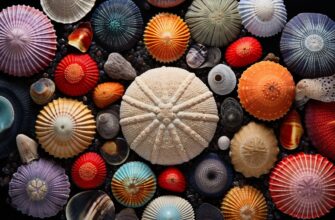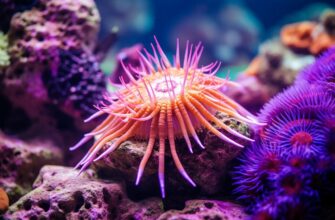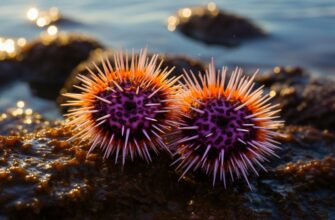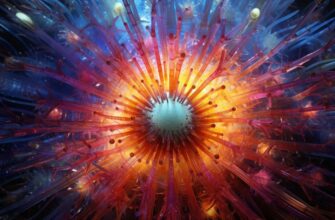Marine ecosystems are a complex web of organisms, each with their own unique role in maintaining a delicate balance. One such role is that of decomposers, organisms responsible for breaking down organic matter and recycling nutrients back into the ecosystem. While bacteria and fungi are commonly recognized as decomposers, recent research has suggested that sea urchins may also play a significant role in the process.
Sea urchins are spiny creatures commonly found in rocky intertidal zones and shallow waters around the world. They are typically thought of as herbivores, feeding on algae and other plant matter. However, some species have also been observed feeding on carrion and other organic debris, leading scientists to investigate their potential as decomposers.
- Key Takeaways
- Understanding Decomposer Organisms in Marine Ecosystems
- Understanding Decomposer Organisms in Marine Ecosystems: A Closer Look
- Sea Urchins and the Decomposition Process in Marine Environments
- The Ecological Role of Sea Urchins as Decomposers
- Examining Sea Urchins’ Impact on Organic Matter Decomposition
- Factors Influencing Sea Urchins’ Decomposer Abilities:
- Sea Urchins and the Nutrient Balance in Marine Ecosystems
- The Implications of Sea Urchins’ Decomposer Role
- Sea Urchin Overgrazing Example
- Conservation and Management of Sea Urchin Populations
- Future Research on Sea Urchins as Decomposers
- Understanding the Complexities of Ocean Decomposition
- Conclusion
- FAQ
- Q: What is decomposition?
- Q: What are decomposer organisms?
- Q: Are sea urchins decomposers?
- Q: What is the role of sea urchins in decomposition?
- Q: Can sea urchins impact the decomposition of organic matter?
- Q: What factors can influence sea urchins’ ability to decompose?
- Q: How do sea urchins contribute to nutrient cycling?
- Q: What are the implications of sea urchins’ role as decomposers?
- Q: How can sea urchin populations be conserved and managed?
- Q: What future research is needed on sea urchins as decomposers?
- Q: Why are sea urchins important in the decomposition process?
- Q: Are sea urchins decomposers?
Key Takeaways
- Marine ecosystems rely on decomposers to break down organic matter and recycle nutrients.
- Sea urchins may also play a role in decomposition through their feeding habits.
- Further research is needed to fully understand the extent of sea urchins’ contribution to the decomposition process in the ocean.
Understanding Decomposer Organisms in Marine Ecosystems
Decomposer organisms play a vital role in marine ecosystems. These organisms break down dead organic matter into simple nutrients that can be reused by other organisms in the ecosystem. Without decomposers, nutrient cycling in the marine environment would be severely disrupted.
There are many different types of decomposer organisms present in marine ecosystems, including bacteria, fungi, and invertebrates. Bacteria are some of the most prolific decomposers in the ocean, breaking down organic matter into simpler compounds that can be used by other organisms. Fungi also play a crucial role in decomposition, breaking down complex organic molecules and recycling nutrients.
Invertebrates such as crustaceans, echinoderms, and mollusks also contribute to the decomposition process in marine ecosystems. These organisms help break down organic matter through physical processes such as grinding and shredding. Sea urchins, in particular, have been shown to be important decomposers in marine environments.
Understanding Decomposer Organisms in Marine Ecosystems: A Closer Look
Each decomposer organism has its own unique role in the decomposition process. Bacteria, for example, break down organic matter into its component parts, such as carbon, nitrogen, and phosphorus. Fungi primarily break down complex organic compounds such as lignin and cellulose. Invertebrates, on the other hand, tend to shred and grind organic matter into smaller pieces that can be more easily consumed by bacteria and other organisms.
Decomposer organisms are also important for nutrient cycling in marine ecosystems. When organic matter is broken down by decomposer organisms, nutrients are released back into the ecosystem. These nutrients are then available for uptake by other organisms, such as algae and phytoplankton, which are at the base of the marine food chain.
Overall, decomposer organisms play a crucial role in maintaining the health and balance of marine ecosystems. Without these organisms, nutrients would become trapped in organic matter, and the entire ecosystem would suffer.
Sea Urchins and the Decomposition Process in Marine Environments
Sea urchins are fascinating creatures that play an essential role in maintaining a healthy marine ecosystem. They are omnivores, feeding on both plant and animal matter, and are known for their role in controlling seaweed populations. However, less well-known is their potential involvement in the decomposition process.
As with any ecosystem, decomposition is vital in recycling organic matter and maintaining a nutrient balance. Decomposers break down dead organisms, waste, and other organic matter, releasing nutrients back into the ecosystem. While bacteria and fungi are often recognized as decomposers, studies show that sea urchins may also contribute to this essential process.
Sea urchins are known to feed on kelp, the dominant form of marine vegetation in cold-water environments. When kelp dies, it sinks to the bottom, where it decomposes and releases nutrients into the sediment. Sea urchins facilitate the decomposition process by breaking down the kelp into smaller pieces that can be more easily consumed by bacteria and fungi. In doing so, they release nutrients back into the ecosystem that are essential for the growth of other marine organisms.
Studies have also shown that sea urchins can digest various types of animal matter, including dead fish and crustaceans. By breaking down these organisms, sea urchins contribute to the recycling of organic matter and the release of nutrients back into the ecosystem.
However, it’s essential to note that not all sea urchin species are capable of contributing to the decomposition process. Factors such as temperature, food availability, and environmental conditions can impact their feeding habits and efficiency as decomposers. Further research is needed to understand the extent of sea urchins’ contribution to the decomposition process and the factors that influence their efficiency as decomposers.
The Ecological Role of Sea Urchins as Decomposers
Sea urchins play a crucial role in nutrient cycling and food webs in marine ecosystems. As decomposers, they contribute to the breakdown and recycling of organic matter, releasing essential nutrients back into the environment.
Sea urchins primarily feed on algae, but they will also consume dead plant and animal material, including kelp, seagrass, and coral. When consuming these materials, they break down the organic matter and accelerate the decomposition process by increasing the surface area for bacterial and fungal colonization.
The nutrients released during decomposition are then available to other organisms, contributing to the overall health and productivity of the ecosystem. Furthermore, sea urchins’ feeding activities help maintain the balance of nutrient availability, preventing the overgrowth of certain species and promoting the growth of others.
One study found that sea urchins removed up to 70% of leaf litter in seagrass meadows, reducing the accumulation of organic matter and promoting the growth of seagrasses. In this way, sea urchins contribute to the maintenance and diversity of the ecosystem.
However, the ecological role of sea urchins as decomposers is not without controversy. Some studies suggest that high densities of sea urchins may have a negative impact on other species by consuming too much of the available organic material, potentially leading to shifts in ecosystem structure and function.
Despite these concerns, it is clear that sea urchins play a vital role as decomposers in marine ecosystems, contributing to nutrient cycling and maintaining the balance of the ecosystem. Understanding their role and the factors that influence their efficiency as decomposers is essential for the conservation and management of these important organisms.
Examining Sea Urchins’ Impact on Organic Matter Decomposition
As previously mentioned, sea urchins have shown potential in contributing to the decomposition process in marine environments. However, the extent of their impact on organic matter decomposition is still a topic of research and investigation.
Several studies have examined the role of sea urchins in the decomposition process and their contribution to nutrient cycling in the ocean ecosystem. For instance, a research study conducted by Wu et al. in 2016 found that sea urchins significantly increased the rate of organic matter decomposition in a seagrass ecosystem. This study suggests that sea urchins are important decomposers in seagrass beds and are crucial for nutrient cycling.
Another research study conducted by Steneck and Dethier in 1994 found that sea urchins were responsible for breaking down large amounts of kelp that had washed ashore. The sea urchins fed on the kelp, breaking it down into smaller particles that were then consumed by other organisms, allowing for nutrient cycling to occur.
These studies suggest that sea urchins have a significant impact on organic matter decomposition, contributing to nutrient cycling in marine environments. However, more research is needed to fully understand the extent of their contribution and how it affects ecosystem dynamics.
“Sea urchins are important decomposers in seagrass beds and are crucial for nutrient cycling.”
Factors Influencing Sea Urchins’ Decomposer Abilities:
While sea urchins play a significant role in nutrient cycling and organic matter decomposition, their efficiency as decomposers can be influenced by several factors. One of the key factors that affect their ability to decompose organic matter is the temperature of the water. Sea urchins are ectothermic, which means that their body temperature is regulated by the surrounding water temperature. Warmer waters can increase their metabolism and enhance their decomposition abilities, while colder waters can slow down their metabolic functions and decrease their efficiency.
Another crucial factor that can impact sea urchins’ decomposer abilities is the availability of food. Sea urchins feed on a variety of organic matter, such as algae, kelp, and seagrasses. If these food sources are limited, the sea urchins may not have enough energy to effectively break down organic matter and release nutrients back into the ecosystem.
Environmental conditions, such as water flow and oxygen availability, can also play a role in the efficiency of sea urchins as decomposers. High water flow rates can displace dead organic matter and limit the sea urchins’ access to it, while low oxygen levels can reduce their metabolic functions and hinder their decomposition abilities.
Other factors that can influence sea urchins’ decomposer abilities include their size, age, and reproductive status. Larger sea urchins may have a higher capacity for consuming organic matter, while younger or reproductive individuals may prioritize energy allocation towards growth and reproduction rather than decomposition.
Overall, understanding the various factors that can influence sea urchins’ decomposer abilities is essential for predicting and managing their impact on marine ecosystems.
Sea Urchins and the Nutrient Balance in Marine Ecosystems
Sea urchins play a crucial role in maintaining the nutrient balance of marine ecosystems through their decomposition activities. As they break down organic matter, they release nutrients back into the ecosystem, which are then available for other organisms to use.
Studies have shown that sea urchins are particularly efficient at recycling nitrogen, an essential nutrient for many marine organisms. In fact, in some ecosystems, sea urchins are the main contributors to nitrogen recycling. By keeping nutrient levels in check, they help to maintain the overall health and productivity of the ecosystem.
However, the impact of sea urchins on nutrient cycling can be influenced by a variety of factors. For example, changes in sea urchin populations or feeding habits can alter the amount and type of nutrients that are released during the decomposition process. Environmental conditions, such as temperature and water quality, can also affect the efficiency of sea urchins as decomposers.
Despite these complexities, it is clear that sea urchins are an important piece of the nutrient cycling puzzle in marine ecosystems. By understanding their role as decomposers and the factors that influence their efficiency, we can better manage and conserve these important organisms.
“Sea urchins are particularly efficient at recycling nitrogen, an essential nutrient for many marine organisms.”
The Implications of Sea Urchins’ Decomposer Role
Sea urchins play a critical role in nutrient cycling and the overall health of marine ecosystems. However, their impact as decomposers is not without consequences, both positive and negative.
On the positive side, sea urchins’ decomposition activities release nutrients such as nitrogen and phosphorus back into the ecosystem, making them available to other organisms. This contributes to the overall health and productivity of the ecosystem.
However, overgrazing by sea urchins can also have negative consequences. In areas where sea urchin populations are high, they can consume all available organic matter, leading to a reduction in biodiversity and potential habitat loss for other species. Additionally, changes in sea urchin populations can impact the balance of the ecosystem, as well as the availability of nutrients for other organisms.
It is important to consider the implications of sea urchins’ decomposer role when assessing the overall health of marine ecosystems. Conservation and management efforts should be put in place to maintain healthy sea urchin populations while minimizing negative impacts on other organisms.
Sea Urchin Overgrazing Example
One example of the negative impact of sea urchin overgrazing is the decline of kelp forests in some areas. Kelp is an essential habitat and food source for many marine species, but it is also a potential food source for sea urchins. When sea urchin populations are high, they can consume large amounts of kelp, leading to the degradation and loss of kelp forests. This can have cascading effects on the entire ecosystem, as many species rely on kelp as a primary habitat and food source.
One study conducted in the Aleutian Islands found that sea otters, a natural predator of sea urchins, play a crucial role in maintaining kelp forests. When sea otter populations declined due to hunting, sea urchin populations increased and led to the loss of kelp forests in the area. This highlights the interconnectedness of marine ecosystems and the importance of maintaining healthy populations of all species.
The impact of sea urchins’ decomposer role is complex, and more research is needed to fully understand the implications of their feeding activities on marine ecosystems. However, by carefully managing sea urchin populations and considering their ecological role, we can work towards maintaining healthy and productive marine habitats for all organisms.
Conservation and Management of Sea Urchin Populations
As scientists continue to uncover the importance of sea urchins in the decomposition process, it becomes increasingly crucial to conserve and manage their populations. Overfishing and habitat destruction are significant threats to sea urchin populations, which can have detrimental effects on marine ecosystems.
One promising conservation strategy involves the establishment of marine protected areas (MPAs), which can help to safeguard sea urchin populations from overfishing and habitat destruction. MPAs also have the added benefit of protecting other species and habitats within the ecosystem.
Another management approach involves regulating fishing practices and setting catch limits to prevent overfishing. This strategy can help to maintain sea urchin populations at a sustainable level while also preserving their role in nutrient cycling.
It is essential to understand the ecological implications of sea urchin population changes. For example, a decline in sea urchin populations may lead to an overgrowth of algae, which can have negative impacts on other marine organisms.
Effective conservation and management efforts require collaboration between scientists, policymakers, and local communities. By working together, we can ensure the continued contribution of sea urchins to marine ecosystem health for generations to come.
Future Research on Sea Urchins as Decomposers
While research has shed light on the importance of sea urchins in the marine decomposition process, there is still much to learn about these fascinating creatures. Further studies are necessary to gain a deeper understanding of their feeding habits, efficiency as decomposers, and impact on nutrient cycling in marine ecosystems.
One area of future research could focus on the effects of climate change on sea urchin populations and their role as decomposers. Rising sea temperatures and ocean acidification may impact their feeding behavior and ability to break down organic matter, which could have significant consequences for nutrient cycling and overall ecosystem health.
Another avenue for research could explore the potential for biomimicry based on sea urchin decomposition processes. Understanding how these organisms break down organic matter and release nutrients could inspire new technologies and approaches for sustainable waste management.
Furthermore, future studies could investigate the relationship between sea urchin populations and other decomposer organisms in marine ecosystems. By understanding how these organisms interact and contribute to the decomposition process, we can better appreciate the complexity of ocean ecosystems and the importance of conservation efforts.
In summary, ongoing research on sea urchins as decomposers is crucial for understanding the intricate workings of marine ecosystems and for informing conservation and management efforts.
Understanding the Complexities of Ocean Decomposition
The process of decomposition in marine environments is a complex and multifaceted phenomenon. It involves a wide range of organisms and interactions, each playing a unique role in recycling organic matter and maintaining the health of marine ecosystems. Sea urchins are among the many organisms that contribute to decomposition in the ocean.
However, the process of decomposition is not simply a matter of breaking down organic matter into its component parts. It also involves nutrient cycling, which is the process by which nutrients are continually cycled through a marine ecosystem. The decomposition of organic matter contributes to nutrient availability for other organisms, which in turn contributes to the overall health of the ecosystem.
Sea urchins play a critical role in this process as decomposers. Their feeding activities break down organic matter, releasing nutrients back into the ecosystem and contributing to nutrient cycling. As such, they are an important part of marine ecosystems and their role as decomposers should not be underestimated.
However, the complexities of decomposition in marine environments mean that the role of sea urchins as decomposers is not always straightforward. Factors such as temperature, food availability, and environmental conditions can all impact their efficiency as decomposers and therefore their contribution to nutrient cycling.
Further research is needed to fully understand the intricacies of decomposition in marine environments, including the contribution of sea urchins as decomposers. Increased knowledge and understanding can contribute to better conservation and management efforts to ensure that these vital organisms continue to play a crucial role in maintaining the health of marine ecosystems.
Conclusion
After exploring the topic of sea urchins as decomposers in marine ecosystems, it is clear that these spiny creatures play a vital role in maintaining the balance of ocean environments. Sea urchins are efficient decomposers, breaking down organic matter and releasing nutrients back into the ecosystem.
Through their feeding activities, sea urchins contribute to nutrient cycling and the overall health of marine habitats. While factors such as temperature and food availability can impact their efficiency as decomposers, sea urchins remain a key component of the decomposition process in marine environments.
It is important to conserve and manage sea urchin populations to ensure their continued contribution to marine ecosystem health. Further research is also needed to better understand the complexities of ocean decomposition and the exact extent of sea urchins’ contribution.
In conclusion, sea urchins are indeed decomposers and should be recognized as an important organism in marine ecosystems. Their role in the decomposition process highlights the interconnectedness of marine habitats and the need to protect the delicate balance of these environments.
FAQ
Q: What is decomposition?
A: Decomposition is the process by which organic matter is broken down into simpler components by decomposer organisms. It plays a vital role in recycling nutrients and maintaining the balance of ecosystems.
Q: What are decomposer organisms?
A: Decomposer organisms are organisms that break down organic matter and recycle nutrients back into the ecosystem. They include bacteria, fungi, and other microorganisms that play a crucial role in the decomposition process.
Q: Are sea urchins decomposers?
A: Yes, sea urchins are considered decomposers. They have the ability to break down organic matter and release nutrients into marine ecosystems through their feeding activities.
Q: What is the role of sea urchins in decomposition?
A: Sea urchins contribute to the decomposition process by feeding on organic matter and breaking it down into smaller particles. This releases nutrients back into the ecosystem and helps maintain the nutrient balance in marine environments.
Q: Can sea urchins impact the decomposition of organic matter?
A: Yes, studies have shown that sea urchins can have a significant impact on the decomposition of organic matter. Their feeding activities contribute to nutrient cycling and can influence the availability of nutrients for other organisms in the ecosystem.
Q: What factors can influence sea urchins’ ability to decompose?
A: Several factors can influence sea urchins’ efficiency as decomposers, including temperature, food availability, and environmental conditions. These factors can affect their role in the decomposition process and nutrient cycling in marine ecosystems.
Q: How do sea urchins contribute to nutrient cycling?
A: Sea urchins play a vital role in nutrient cycling by breaking down organic matter and releasing nutrients back into the environment. Their decomposition activities help maintain the nutrient balance in marine ecosystems and support the growth and survival of other organisms.
Q: What are the implications of sea urchins’ role as decomposers?
A: Sea urchins’ role as decomposers can have both positive and negative ecological implications. Changes in sea urchin populations can affect nutrient cycling and ecosystem dynamics, highlighting the importance of understanding and managing their populations.
Q: How can sea urchin populations be conserved and managed?
A: Conserving and managing sea urchin populations is crucial to maintain their role as decomposers. This can be done through measures such as protecting their habitats, implementing sustainable fishing practices, and monitoring population dynamics to ensure their continued contribution to ecosystem health.
Q: What future research is needed on sea urchins as decomposers?
A: Further research is needed to better understand sea urchins’ role as decomposers and their impact on marine ecosystems. This research can contribute to improved conservation and management efforts, as well as enhance our understanding of the complexities of ocean decomposition.
Q: Why are sea urchins important in the decomposition process?
A: Sea urchins are important in the decomposition process due to their ability to break down organic matter and release nutrients back into the ecosystem. They contribute to nutrient cycling and play a vital role in maintaining the balance of marine ecosystems.
Q: Are sea urchins decomposers?
A: Yes, sea urchins are considered decomposers. They play a crucial role in the decomposition process in marine environments, contributing to nutrient cycling and maintaining the health of marine ecosystems.

